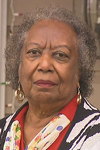Racism, Medicine, and Bioethics
Learning From the Past to Ensure a Healthier Future
Event Details and Speakers
Medical Apartheid Goes Viral: How Infection Catalyzes Bioethical Erosion
Harriet A. Washington, MAHarriet A. Washington, MA, ethicist and author of Medical Apartheid: The Dark History of Experimentation from Colonial Times to the Present, which won a National Book Critics Circle Award, outlined the historical roots of racial mistreatment in the U.S. medical research arena. She discussed contemporary challenges to ethical research and health care, from the elision of informed consent to the neoeugenic policies, through the lens of the COVID-19 pandemic.
 |
Enduring Ethical Lessons From the Past: Learning From the USPHS Syphilis Study at Tuskegee
Lillie Head and Riggins R. Earl, Jr., PhDThe United States Public Health Service Syphilis Study at Tuskegee is used as a case study of the exploitation of communities of color at the hands of medical professionals. What are the lessons learned and how far has medical ethics really come in terms of the treatment of Black and other communities of color? Lillie Head, president of Voices for Our Fathers Legacy Foundation, and Riggins R. Earl, Jr., PhD, professor of ethics and theology, Interdenominational Theological Center, discussed the study, its legacy and impact on the 623 unknowing participants.
 |
 |
The Politics of Health Policy: Integrating Racial Justice Into Health Care and Clinical Research
Daniel Dawes, JDWhat are political determinants of health? How have they driven inequities in the U.S. health care system? Daniel Dawes, JD, director of the Satcher Health Leadership Institute Morehouse School of Medicine, shared an inclusive approach to addressing health issues impacting the most vulnerable populations in an increasingly complex health care system and political environment.
 |
The History of Structural Racism in Charlottesville: Legally-enforced Segregation and Its Impact on Health
Dayna Bowen Matthew, JD, PhDUsing Charlottesville as a case study, Dayna Bowen Matthew, JD, PhD, Dean and Harold H. Greene Professor of Law at the George Washington University Law School, explored the theory, mechanisms, and impact on health of legally-mandated residential segregation and how we can identify and redress historical inequities.
 |